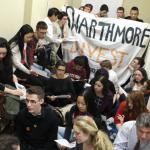Students Occupy Swarthmore College in Fossil Fuel Divestment Protest

Student activists have occupied a historic hall at Swarthmore College, the alma mater of the United Nations climate chief, demanding the university cut its ties to fossil fuels.
The sit-in at the liberal arts college in Pennsylvania launches a new wave of protests by campus divestment campaigners across the US that will culminate in an old-style teach-in at Harvard on 13 April.
Some 37 students and six alumni entered the finance and investment office of the university at about 9am on Thursday.
“We are in,” said Stephen O’Hanlon, a political science student. He said the students planned to stay until university administrators agree to return to negotiations on a divestment plan. “At this point we have no plans to leave,” he said.
Swarthmore, founded by Quakers, helped launch the campus divestment movement, now active at hundreds of universities across North America, Europe and Australia.
Christiana Figueres, the UN climate chief, graduated in 1979. The UN agency she heads, which is charged with guiding international negotiations towards a global deal on climate change, supports divestment.
“It sends a signal to companies, especially coal companies, that the age of ‘burn what you like, when you like’ cannot continue,” a spokesman said.
Nearly two-thirds of Swarthmore’s 1,500 students signed a petition last December calling on the university to exit coal, oil and gas holdings. TheSwarthmore Mountain Justice campaign is calling for an immediate freeze on new fossil fuel investments, followed by a staged withdrawal over five years. It urges the university to invest 1% of the endowment in renewable energy.
Nearly 100 faculty and about 1,000 alumni also support the divestment campaign, making this one of the biggest campaigns in Swarthmore’s history, the activists said.
“We think the conflict between Swarthmore’s Quaker values and the destruction produced by the fossil fuel industry is untenable,” said Sara Blazevic, who is graduating this year in comparative literature. “There is a choice before the board to stand on the right side of history and to stand with our generation.”
Campaigners and university administrators have held more than 30 meetings on divestment over the last four years. But those talks stalled in February after the university hosted a two-day discussion on climate change.
The university said its opposition to divestment remains unchanged.
“In 2013, following a two-year period of study and analysis the college chose not to divest from fossil fuels within its investment portfolio and this decision has remained unchanged since that time,” Gregory Brown, vice-president for finance and administration.
The university at the time dismissed divestment as a symbolic gesture, and warned divestment would slice $10m (£6.7m) to $15m off the income generated from Swarthmore’s $1.6bn endowment, much of which goes for scholarships.
The students reject the argument, citing the recent drop in oil prices and the uncertainties over the long-term of investing in fossil fuels.
“The investment committee denies the existence of the carbon bubble and false claims that no active managers can pursue a fossil-free investment strategy effectively. We know this is wrong,” said Guido Girgenti, a political science student due to graduate this year. “The carbon bubble poses a serious financial threat to our endowment.”
